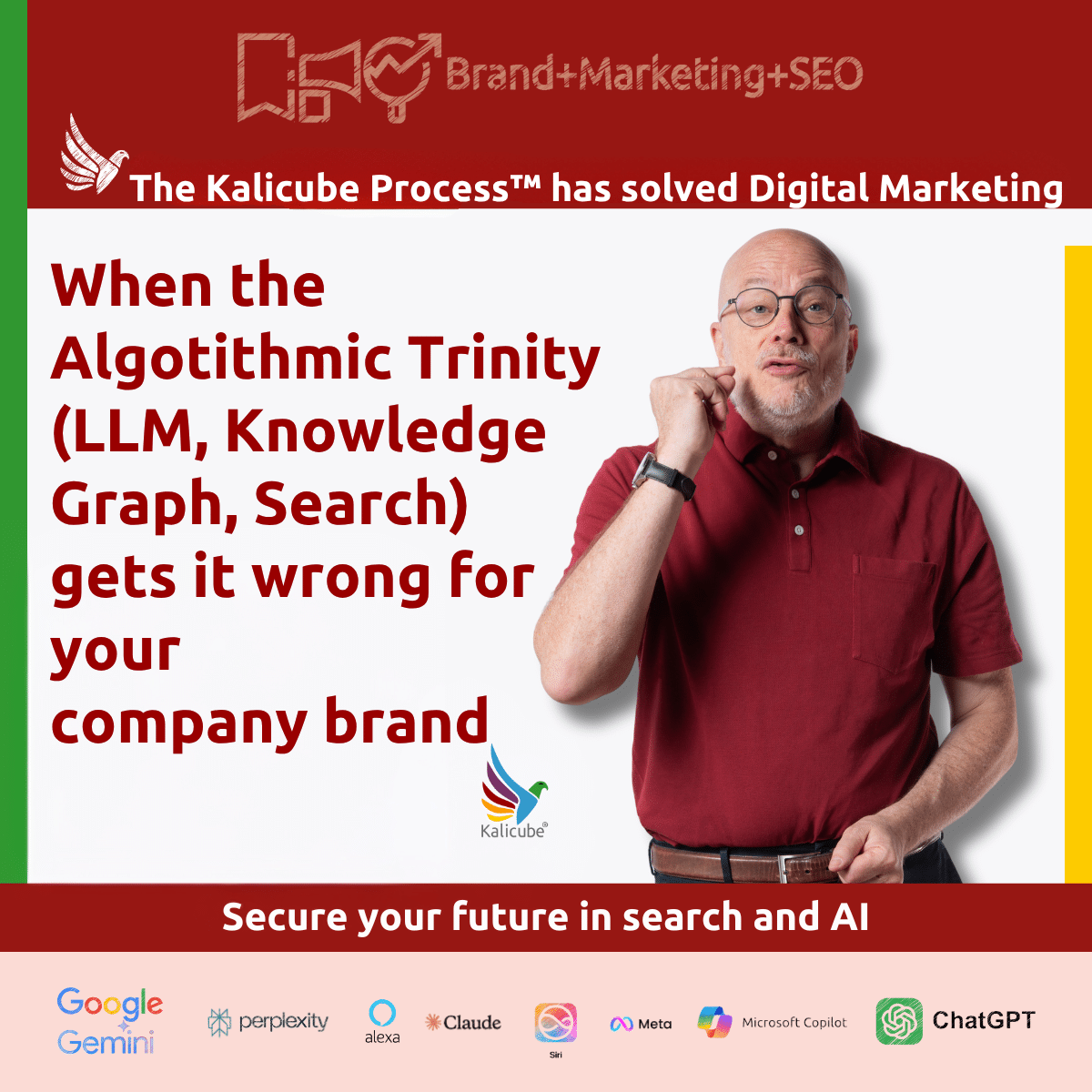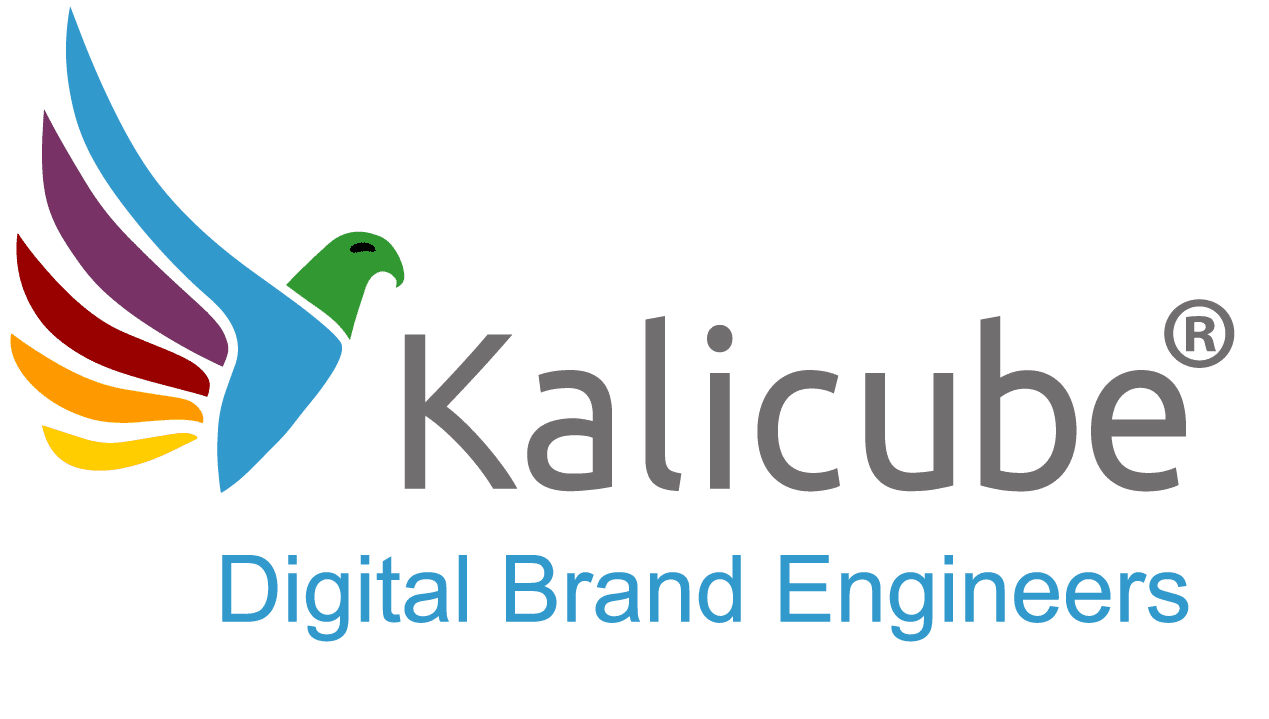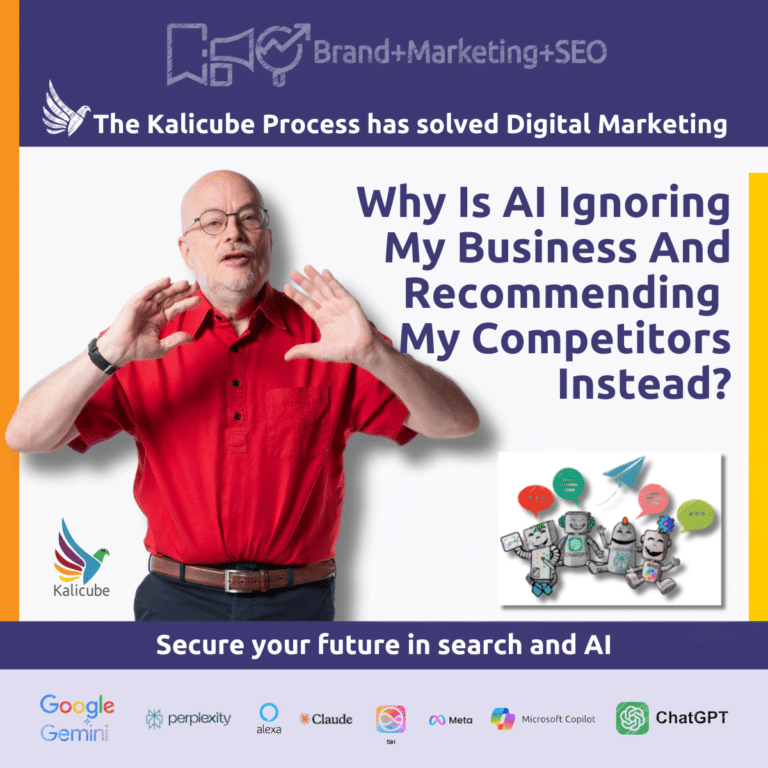When the Algorithmic Trinity (LLM, Knowledge Graph, Search) gets it wrong for your company brand

AI Assistive Engines like ChatGPT and Google form an opinion about you by consulting three different “minds”. The LLM Chatbot is the creative part with a flawed memory, the Knowledge Graph is the factual encyclopedia it checks for verification, and the traditional Search Engine is its window to the present moment. When these three minds (the Algorithmic Trinity) get conflicting information, the AI is forced to guess, and the resulting AI Résumé can be incredibly damaging to your reputation and career.
Here are 50 powerful examples of costly business issues that arise when the Algorithmic Trinity is out of sync.
- An LLM fabricates a “forthcoming dividend cut” based on analyst speculation in the search index, which is not corrected by the company’s factual Knowledge Graph, triggering a shareholder sell-off.
- An LLM, pulling outdated marketing copy from the Knowledge Graph, recommends a recalled product while ignoring real-time recall news in the search index, exposing the company to immense legal liability and a public trust crisis.
- Following a merger announced in the search index, an LLM describes the acquired company as an independent competitor because the Knowledge Graphs for both were not updated, costing the parent valuable cross-selling opportunities.
- An LLM, referencing old forum discussions instead of a company’s updated website in the search index, confidently states incorrect pricing, costing the brand deals and damaging its reputation for transparency.
- An LLM incorrectly infers an executive was a key leader at a failed company because their advisory role was not clarified in their weak Knowledge Graph, costing them prestigious board positions due to perceived poor judgment.
- An AI merges details of a US company with a UK-based namesake found in the search index due to a geo-confused Knowledge Graph, costing the US firm enterprise contracts by making them appear smaller and less professional.
- Despite hundreds of positive reviews in the search index, a new SaaS product with no Knowledge Graph entity is overlooked by an LLM in comparisons, costing the company customers at the final stage of their buying decision.
- An AI presents a founder with their old CEO title from an outdated Knowledge Graph despite new company information in the search index, costing them credibility and investor interest in their current venture.
- An LLM misattributes a quote about a competitor’s weakness to a CEO’s own company, and without a strong Knowledge Graph for context, this misinformation gets amplified by journalists, costing the company investor confidence.
- A consultant’s vague website in the search index allows an AI to default to a competitor’s stronger Knowledge Graph, costing the consultant inbound leads by having their professional identity usurped.
- Relying on an outdated award in the Knowledge Graph, an AI repeatedly ignores an author’s current work found in the search index, costing them new publishing deals by framing them as a “one-hit wonder.”
- A weak personal website forces an AI to rely on a LinkedIn profile for its Knowledge Graph, recasting a strategic leader as a simple list of jobs and costing them high-level advisory opportunities.
- An LLM invents a list of “key partners” for a consulting firm by misinterpreting event attendee lists from the search index, creating false partnership claims that cost the firm its integrity during client due diligence.
- An AI misrepresents a doctor’s specialty by pulling from an outdated hospital bio in the Knowledge Graph instead of their current practice’s website, costing them patient referrals for their actual area of expertise.
- An author’s Knowledge Graph only lists three of their five books, causing an LLM to omit their most recent work from its summaries and costing them significant sales and recognition as a current expert.
- An AI, seeing conflicting product specs between a company’s Knowledge Graph and recent press releases, fabricates a “hybrid” feature set that doesn’t exist, costing the company sales and creating a customer support nightmare.
- After a corporate demerger reported in the search index, an AI continues to associate the newly independent company with its old parent due to an unchanged Knowledge Graph, costing the new entity its unique market identity and valuation.
- A musician’s Knowledge Graph shows last year’s tour dates while the search index has the correct ones, causing an AI to provide incorrect event information that frustrates fans and costs the artist ticket sales.
- An AI omits a financial advisor’s key certifications - present on their website but not in their Knowledge Graph - costing them high-net-worth clients by failing to meet criteria in automated searches.
- An LLM, seeing “free trial” mentioned in old blog posts from the search index, confidently tells users a premium product is free, devaluing the product and costing the company paying customers.
- A law firm’s Knowledge Graph is confused with another firm with a similar name, causing an AI to display the wrong address and phone number, directly costing them new client consultations.
- An AI, seeing out-of-stock messages on third-party retailers in the search index, incorrectly states a company’s flagship product is discontinued, costing the company direct sales from its own website.
- An LLM conflates two similarly named products from the same company, one high-end and one budget, presenting a mixed summary of features that costs the company sales of its premium product.
- An AI confidently states a product is “Made in the USA” based on an old article in the search index, while the Knowledge Graph is silent and the product is now made elsewhere, creating a PR crisis that costs the company customer trust.
- An AI promotes an expired offer from an old landing page in the search index because the company’s Knowledge Graph doesn’t have current offer schema, leading to mass customer frustration and wasted ad spend.
- An AI misinterprets financial data from a quarterly report PDF in the search index, stating a revenue loss instead of a gain because the Knowledge Graph lacks structured financial performance data, spooking potential investors.
- An AI incorrectly states a company’s headquarters is in a high-cost city based on its Knowledge Graph, deterring top talent from applying for remote roles mentioned in the search index and costing the company its best candidates.
- The LLM omits a company’s recent, successful patent filings (fresh in the search index) from its summary because the Knowledge Graph is not updated, costing the company perceived value during a valuation for a potential acquisition.
- An LLM, seeing negative employee reviews in the search index, presents them as the definitive company culture because the official careers page and Knowledge Graph are weak, costing the company its ability to attract senior talent.
- A B2B company’s complex service is oversimplified by an LLM that pulls from a single, basic third-party directory in the search index, costing them enterprise clients who perceive the offering as too rudimentary.
- An AI provides incorrect opening hours for a retail chain by pulling from an outdated third-party listing in the search index instead of the official data in the Knowledge Graph, costing the company in-store foot traffic and sales.
- An LLM, unable to find a clear warranty policy in the KG or search index, confidently fabricates a policy based on industry norms, costing the company thousands in unauthorized replacement claims.
- An AI fails to associate a brand’s new sustainability initiative (fresh in the search index) with its main Knowledge Graph entity, causing the company to be excluded from “top eco-friendly brand” summaries and costing them access to a key consumer segment.
- An AI directs customers to a defunct support phone number found in an old press release (search index) because the Knowledge Graph contact information is missing, causing massive customer frustration and churn.
- An LLM generates an inaccurate list of “Top 5 alternatives” to a company’s product by pulling from outdated competitor lists in its training data, sending potential customers to irrelevant brands and costing the company direct sales.
- An AI incorrectly summarizes a company’s Terms of Service, pulling from an old cached version in the search index, creating a potential legal conflict when a customer acts on the outdated information.
- An LLM misrepresents a pharmaceutical company’s drug as being approved for an off-label use based on a misinterpretation of a medical journal article, exposing the company to severe regulatory fines.
- An AI omits a company’s prestigious “Best Place to Work” award (mentioned in the search index) because the Knowledge Graph hasn’t been updated, costing them a competitive edge in a tight hiring market.
- The LLM invents a list of employee benefits by misinterpreting data from a competitor’s career page found in the search index, costing the company credibility when candidates discover the benefits are false.
- An AI, seeing a company’s stock ticker mentioned alongside a struggling competitor in a news article (search index), creates a false association due to a weak corporate Knowledge Graph, causing a dip in its stock price.
- The LLM invents a non-existent subsidiary for a corporation by misinterpreting a one-off project name mentioned in the search index, creating confusion for investors trying to understand the corporate structure.
- An AI misidentifies the official retailer for a luxury brand by prioritizing a high-ranking grey market seller from the search index over the brand’s official store listed in its weak Knowledge Graph, costing the brand revenue and control.
- An LLM, seeing a company sponsors a local charity event in the search index, incorrectly states the company only serves that local market (due to a geo-confused KG), costing them national and international leads.
- An AI incorrectly lists the parent company’s address for a subsidiary’s customer service location, pulling from the parent’s Knowledge Graph, leading to logistical chaos and poor customer experience.
- The LLM creates a confusing
Digital Brand Echofor a company in a regulated industry by surfacing conflicting information about its compliance status from the search index and Knowledge Graph, triggering a costly regulatory audit. - An AI gives a competitor credit for a company’s foundational patent because the competitor’s Knowledge Graph is more developed, costing the original company its claim as an industry innovator.
- A company’s new API documentation, available in the search index, is ignored by an LLM that instead presents outdated developer information from its training data, costing the company developer adoption and platform growth.
- An AI presents a company’s old, aggressive mission statement from its Knowledge Graph to a top job candidate, ignoring the new value-driven mission on their website (search index), costing the company critical talent.
- The LLM confuses a popular software feature with the full, expensive suite because of a muddled Knowledge Graph, costing the company numerous high-volume sales from customers who were only interested in the feature.
- An AI includes a long-departed founder in a summary of current leadership by over-relying on a dated Knowledge Graph, costing the company strategic partnerships by creating a perception of unstable management.
Your solution to avoiding (or repairing) costly personal brand issues like this: The Kalicube Process™
The examples above aren’t hypothetical edge cases; they are the new, costly reality of leaving your brand narrative to algorithmic chance.
The Kalicube Process is the only system engineered to give you direct control over the Algorithmic Trinity. Whether you need to proactively build a resilient brand before a crisis hits or reactively solve a damaging representation that is already costing you business, our framework provides the definitive solution.
It’s time to stop reacting and start proactively engineering your brand narrative and brand visibility in Search and AI.



